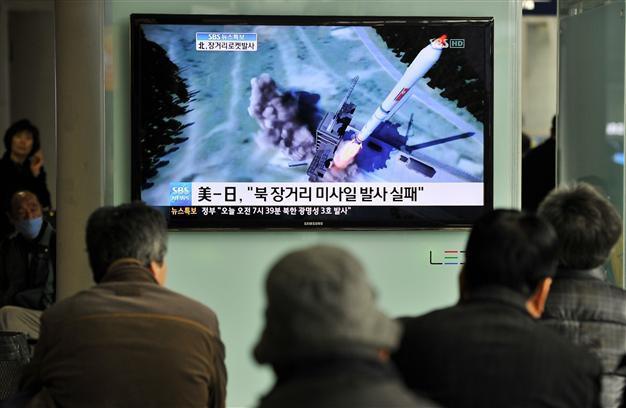World markets mixed as North Korea rocket fails
SHANGHAI - The Associated Press

South Korean people watch a TV screen showing a graphic of North Korea's rocket launch, at a train station in Seoul on April 13, 2012. AFP photo
Shares were mixed Friday, as weak Chinese and U.S. economic data cast a pall over early trading in Europe, but Asian markets rallied after North Korea's rocket launch failed.
France's CAC-40 dropped 1.1 percent to 3,232.73, while Germany's DAX shed 1 percent to 6,676.82. The FTSE 100 index of leading British shares fell 0.5 percent to 5,682.72.
In Asia, markets were upbeat after the North Korean rocket launch exploded soon after takeoff. Asian investors took in stride data showing that China's economy grew at an 8.1 percent pace in January-March, its slowest in nearly three years.
South Korea's Kospi jumped 1.1 percent to 2,008.91.
Tensions had risen as North Korea pushed ahead with the launch despite protests from the U.S., South Korea and other countries that deemed it a test of missile technology. Pyongyang said it was to put into orbit a satellite commemorating the anniversary of its founder's birth.
Mainland Chinese shares were higher on expectations for further measures to boost the economy. The benchmark Shanghai Composite Index edged up 0.3 percent to 2,359.16. The smaller Shenzhen Composite Index added 0.6 percent to 950.91.
"The GDP data is within earlier expectations and both policy and the economy are stable. Even if the slowdown is obvious, growth is still above the government's target," said Li Jianfeng, an analyst at Caida Securities, based in Shanghai. The government's annual growth target is 7.5 percent.
Overall, there was a sense of confidence that China is managing to steer the economy into a slower growth track without veering toward a 'hard landing.' "Chinese policymakers likely are neither as asleep at the wheel nor as paralyzed by political indecision as global investors seem recently to be fearing," Michael Kurtz of Nomura in Hong Kong said in a report.
Overnight, U.S. shares bounced back from a five-day slump. The Dow Jones industrial average climbed 1.4 percent to close at 12,986.58, its second-biggest gain this year.
Suggestions that the European Central Bank may resume purchases of bonds of financially weak countries to help keep yields low and reduce borrowing costs also helped counter worries over possible crises in Italy and Spain.
U.S. stocks were poised to fall. Dow futures were down 0.4 percent to 12,895 while broader S&P 500 futures fell 0.5 percent to 1,379.30.
In currency dealings, the euro was lower, falling 0.2 percent to $1.3157. The dollar inched up to 80.89 Japanese yen.
Concerns persist that high energy prices driven in part by unrest in the Middle East could weigh on any economic recovery. Benchmark oil was down 45 cents to $103.19 in electronic trading on the New York Mercantile Exchange. The contract rose by 94 cents to finish at $103.64 on Thursday.
